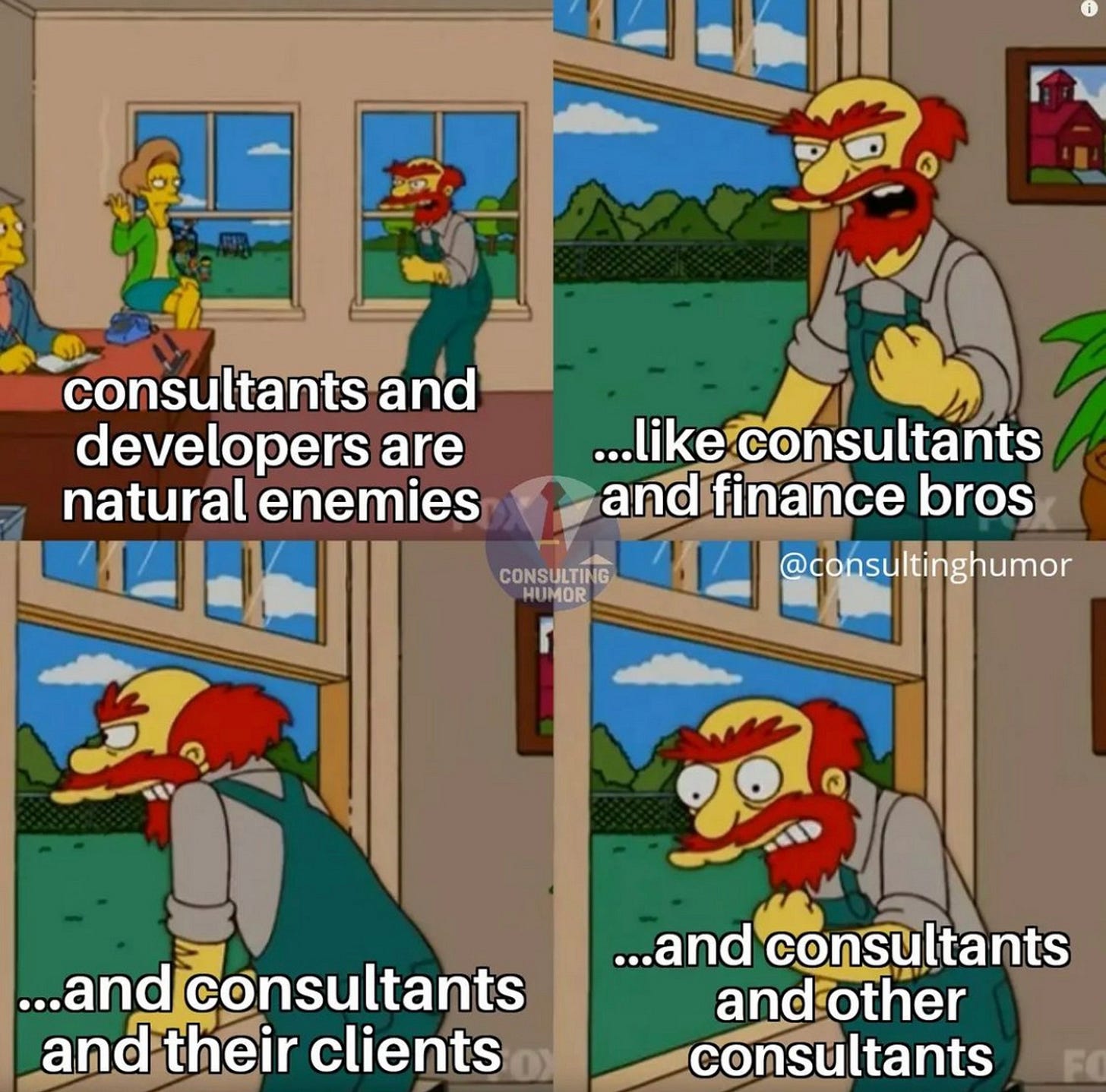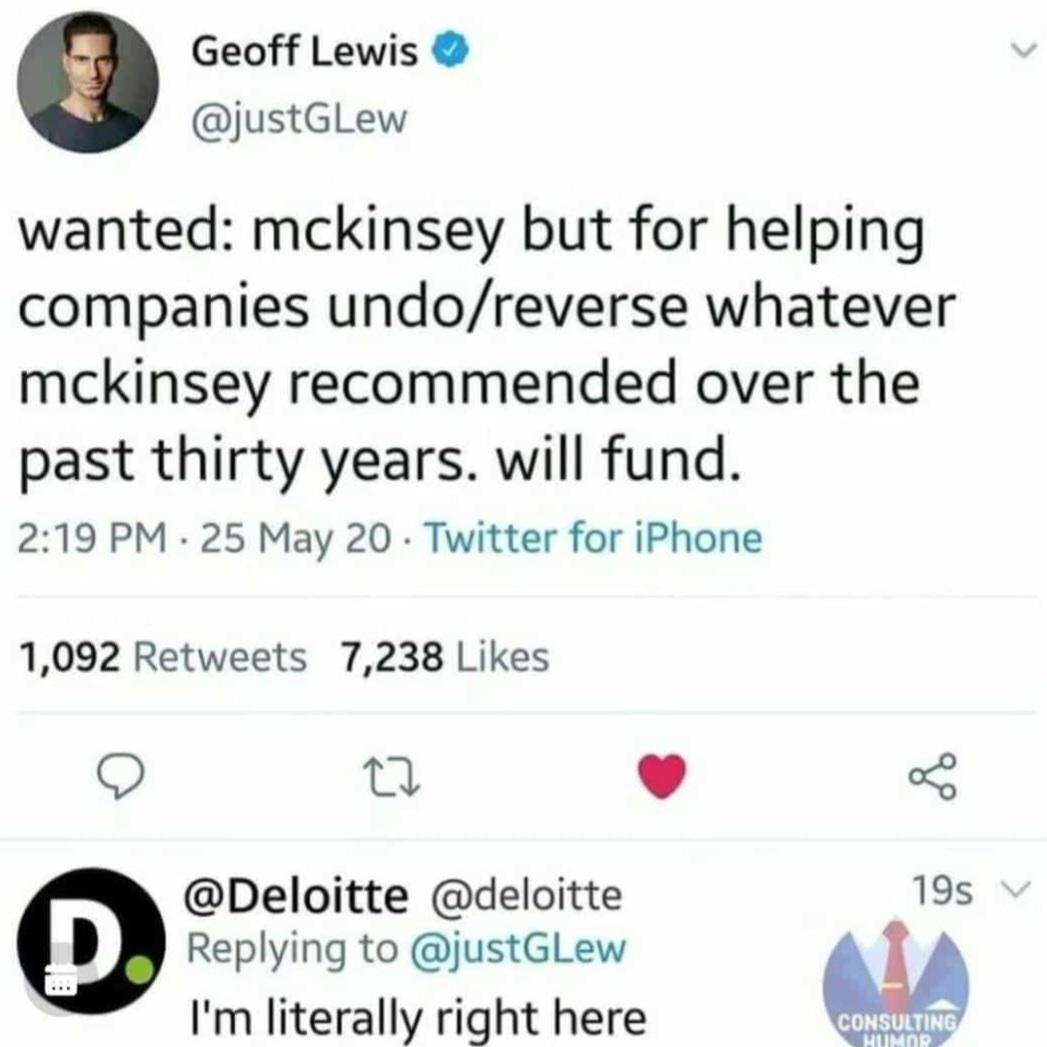Why Everyone Hates Consultants
And Why I Love Being One
“If I have to sit through one more shitty transformation roadmap session from another consultant who has never set foot in the building, I might jump out the window.”
Not the most…productive start to a meeting with an executive I’ve ever had.
I had just been hired by a client to drive transformation initiatives within the accounting and finance functions and over the course of the year we had start to stack successes, each one larger and more impactful from the last, but it was a grind (with a lot of frustrating setbacks).
“Yeah,” I added with a chuckle that probably sounded more nervous that I would’ve liked, “I can’t stand consultants.”
In that moment, I counted my lucky stars that I had taken the approach I did: meet the business where it is and engrain yourself in the operation before you try to make any suggestions on what to change.
See, I’ve sat on every side of the table - I’ve been the prospective client, the client, the consultant, the sub-contractor for the consultant, and the individual contributor who is tasked with working with the consultant. I’ve seen this love-hate relationship from every single angle.
And I think I’ve found a way to make the relationship better…
The Consulting Paradox
Picture this: You're an executive trying to keep your metaphorical airplane on the runway while simultaneously building it. Every decision has a butterfly effect, and your stressed-out team is already maxed out. Then, a consultant parachutes in, promising a perfect view of the future - for a price - without knowing the first thing about your reality on the ground.
Months later, the solution isn't what was promised, everyone's frustrated, and you're stuck with an outsider making waves. Sound familiar?
Why Everyone Hates Consultants
From the client's perspective:
You hire highly recommended experts who promise to fix your problems in X time for Y money
Your team burns out explaining the same issues they've explained to countless consultants before
Two weeks into a twelve-week project, you're behind schedule
Suddenly, you're told it'll cost 20% more, take an extra month, and only solve 80% of the problem
As one of my favorite clients once said: "I want to get a bunch of consultants in a room, throw a dollar in the middle, and see which one walks out with it."
The Hard Truth About Making an Impact
The idea that anyone can walk in and deliver on a million-dollar project without proper due diligence is ludicrous. Here's why:
Making real impact takes time and usually starts small
You're working with people who have lived these problems for years maybe even decades
Even the perfect solution is worthless without buy-in from the team
You're battling both consultant prejudice and organizational inertia
A Different Approach: Honesty
My pitch is harder, but more honest. I tell clients:
"I'm a problem solver, but I cannot promise I can solve all your problems. What I can promise is that we'll move fast, understand your challenges deeply, put effective solutions in place, and scale what works."
Here's how I approach consulting differently:
I get in the mud with your team to understand what's really happening and why
I focus on building a culture of continuous improvement rather than promising quick fixes
I become a soldier in the trenches with you, not a mercenary who disappears when things get tough
I maintain enough distance to stay objective while getting close enough to understand the real issues
The Secret to Effective Consulting
Success in consulting isn't about being the smartest person in the room or having all the answers. It's about earning trust at every level of the organization and showing that you're there as reinforcements, not as a threat.
By the time you're three or four weeks into an engagement, you should feel like part of the team. If you don't, you're probably not going to make the impact you're hoping for.
The Local Nature of Change
Here's the fundamental truth I've learned: All culture is local. A company is made up of individual people, and you won't help the whole unless you help the sum of its parts. This means starting small, making high impact changes, and gradually expanding to adjacent processes - building trust and momentum along the way.
Yes, most people hate consultants. But by being honest about what we can and can't do, by getting our hands dirty alongside our clients, and by focusing on real, sustainable improvements rather than quick fixes, we can change that perception one engagement at a time.



